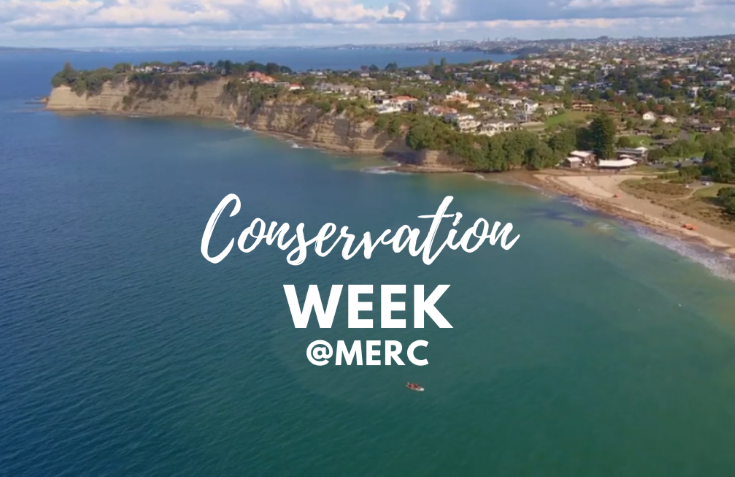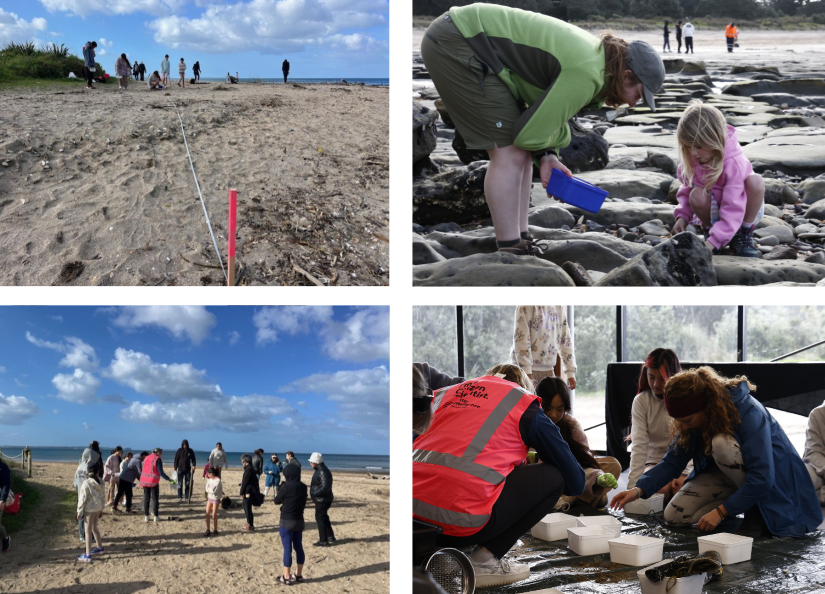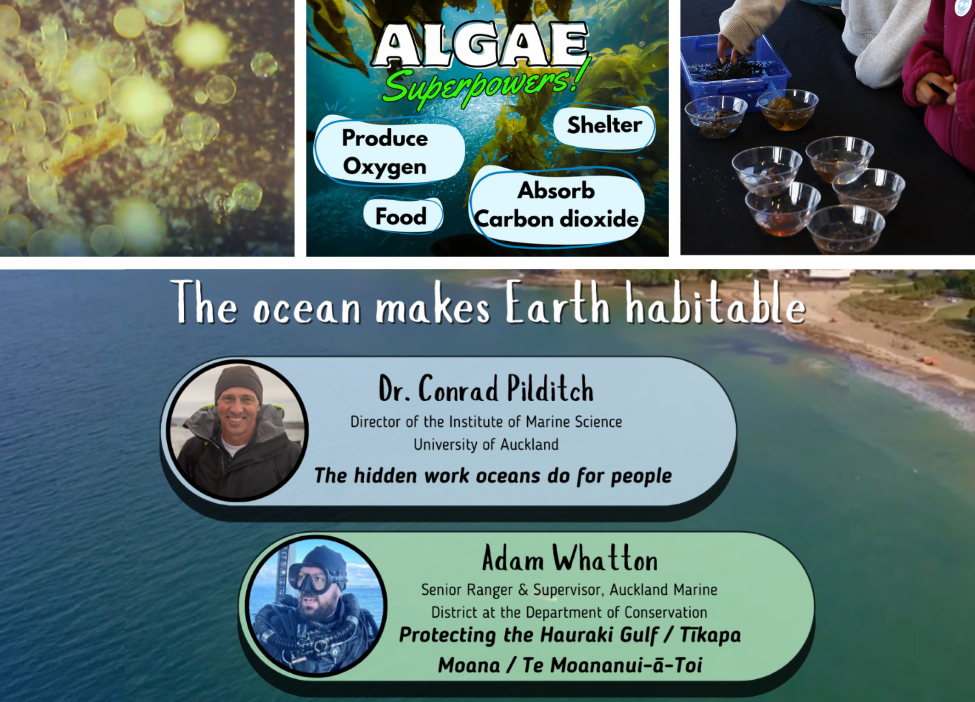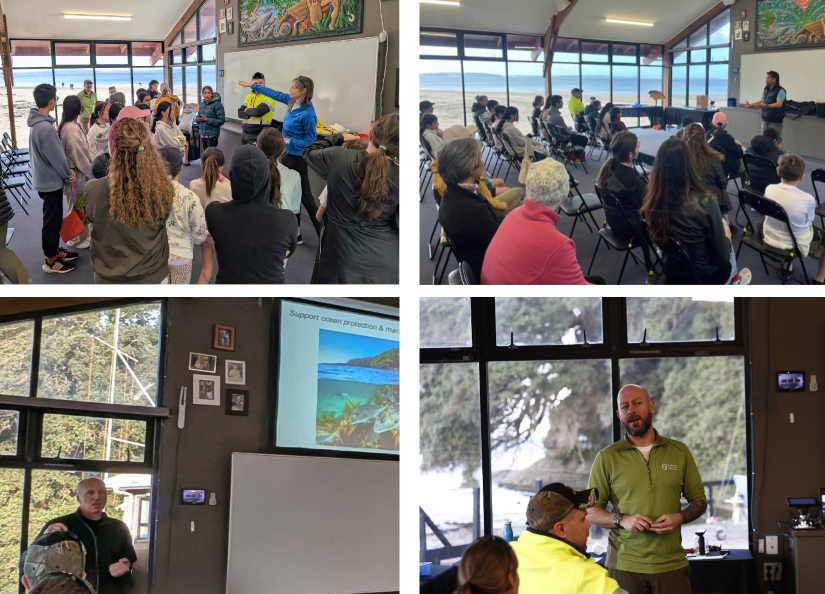
Our Conservation Week event was the second in-person event and 4th overall event in our Ngā Kōrero III Series supported by the New Zealand Commission for UNESCO to help increase Ocean Literacy Across Aotearoa New Zealand. It was an incredible opportunity for learning and action to close out Conservation Week, Te Wiki o Te Taiao 2025! We explored the important ways the ocean sustains life on our blue planet by diving into Ocean Literacy Principle #4: The ocean makes Earth habitable. Along with staff from the Department of Conservation, we led an impressive effort to take action for our ocean through clean-up activities within the Long Bay-Okura Marine Reserve!

We conducted a full Litter Intelligence Survey at our long-term monitoring site along with additional clean-up efforts along the beach and rocky shore. Check out our official survey results! Together we collected hundreds of pieces of rubbish preventing them from going into the sea or being consumed by marine life. Most of the rubbish we collected were various forms of plastic. We know that plastic stays in the environment indefinitely, breaking down into smaller and smaller pieces. These can damage habitats and be consumed or absorbed by marine life causing problems for individual organisms and throughout food webs. Every day we can take action for the ocean to prevent this, both through clean-up activities and through our purchasing choices and responsible waste disposal to help protect our beautiful moana.
We got up-close looks at some of our fabulous marine macroalgae (a.k.a. seaweed) and plankton. These superstars provide over half of the oxygen we breathe, help the ocean absorb most of the carbon dioxide we produce, and form the base of the marine food web supporting life in the ocean. As we learned more about in our excellent presentation by Dr. Conrad Pilditch (the Director of the Institute of Marine Science at the University of Auckland). He also showed us how the ocean circulates heat around the planet, moderating our climate and providing food for billions of people.

Our presentations, both by Dr. Pilditch and by Adam Whatton (the Senior Ranger & Supervisor of the Auckland Marine District at the Department of Conservation), as well as the video from Heal the Hauraki offered suggestions for more ways we can take action for our oceans. Adam discussed how the extended network of Marine Protected Areas proposed for the Hauraki Gulf is an important step toward restoring the Gulf. An increase from protecting less than 6% to around 18% of the Hauraki Gulf, along with changes to how and where we fish and restoration efforts both on land and in the ocean can help make this special area more resilient to future change. Dr. Pilditch emphasized that something we can do to make the biggest difference is through knowing where seafood we eat is coming from and making sustainable choices.
Overfishing is currently one of the largest threats to our marine ecosystems. If you are a seafood lover, consulting sustainable seafood guides can help you make the safest and most sustainable choices.
Things to consider are:
~The species: Is the population stable and how fast can it grow and reproduce? Slower growing and reproducing species like sharks are more susceptible to fishing pressure.
~Where it sits in the food chain: Higher level predators have higher accumulation of contaminants like heavy metals.
~How and where it's caught or farmed: Avoid species caught using damaging and/or high bycatch methods like bottom trawls, dredges and gill nets and fisheries operating in the deep sea; land-based farming tends to have lower impact than farming in the sea, with the exception of filter feeders like mussels, which help clean the surrounding habitat instead of adding pollution.
What we buy also makes a big difference toward reducing waste, particularly plastic. Look for choices without plastic packaging whenever possible, buy in bulk or choose items with reusable and/or recyclable materials. For updates on how to ensure your recycling is done right check out: Recycle right at kerbside | Ministry for the Environment

We are so grateful to everyone who participated in this event and to the team from the Department of Conservation for helping out and sharing their knowledge! And a very special thanks to our two speakers Dr. Conrad Pilditch and Adam Whatton, and to Mandy Kupenga for sharing her inspiring video from Heal the Hauraki. This entire series of events was made possible through funding from the New Zealand National Commission for UNESCO.
To get involved in more opportunities to take action for our ocean join groups active in your community or start your own! To learn more about ocean literacy, view the webinars that are a part of this series on our Seaweek Youtube Channel. For Ocean Literacy resources to use in the classroom, see our Ocean Literacy Educators Guide and other educational resources!
.png)